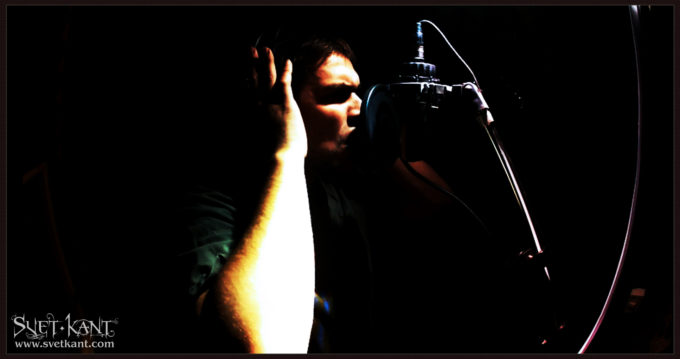Chapter 1 [2011 – 2013]
Meaning
Svet Kant is a Slovenian/English word-game related to the concept of “Holy failure” and/or “denial”. The message behind is that without failure there is no learning, and without learning there is no inner growth or developing of one. It is closely related to the concept of denial (i.e. can’t = Kant) where if proposed, there is actually nothing that can not be achieved throughout life. The message behind the band’s name is that most of our failures come from a mental impediment, rather than a physical. What we get is directly proportional to how many sacrifices we are willing to make to achieve that reality. A reality that will ultimately bring meaning and self-realization.
Originally the band was to be called “Anthropophobia”, but being this name already been taken, the need to come up with a creative and unique name lead to the combination of totally antagonistic languages to narrow the possibilities.
Inception
Svet Kant began as a side project of Santiago Kodela while playing in an Argentinean thrash-metal band (Malicia). Even though the music was varied and alternating, something was missing in terms of dynamism and contrast; so the need to explore new horizons within the metal genre set Santiago on a quest to expand and reach new, unknown musical limits. The wish and need to tread not only onto more extreme music but also more melodic material, established a challenge to blend two often-seen antagonistic styles into one, bringing forth a wider variety of moods, tones, and emotions within each piece. Consequently, there was a need to write lyrics in the English language to be able to reach more fans.
In the year 2010 Santiago parted ways by being let go from his current band (for reasons not to be detailed) and this served as the ultimate motivation, challenging his will despite the unexpected and unpleasant situation.
“Loneliness”
Svet Kant’s original project “Loneliness” was formed by Santiago Kodela and drummer Alejandro Ulrich (Malicia). Expectations grew and recording dates were planned and scheduled. Santiago would commit to tracking all instruments with the exception of drums. However, during the first week of recording (July 2011), Alejandro unexpectedly walked away from the project, leaving him on his own. The idea of canceling the project never crossed his mind and a new recording studio was sought. This lead to finding engineer Ramiro Pacheco from “Music Records”.
After new dates and arrangements were set, the project now needed to find a drummer that would fit the level and intensity “Loneliness” required. Santiago’s will and motivation encountered him with session drummer Santiago Sauza.
Rehearsals went along until new dates were scheduled, set between December 2011 and January 2012. Drum parts were recorded between a six weeks period and things were running as scheduled. While tracking drums the possibility of incorporating a bass player came along with the appearance of Federico Gervan (Against). His instrumental skills were challenged to learning and recording the bass lines in a matter of weeks. Fortunate enough, not only he was up to the challenge, but exceeded all expectations; however, due to a commitment to other musical endeavors, Federico ought to step aside of the project, leaving his imprint as a guest appearance.
After bass was tracked, it was guitars turn. The tracking of all guitar solos and rhythmic sections took longer than expected. Due to the number of arrangements as well as the complexity and technical difficulties of some passages, things got delayed. The recording of the introductory classical guitar piece contributed to this issue. Yet, the end result justified this minor set-back.
Once guitars were tracked, the real challenge arrived for the tracking of the vocals. Not wanting to leave any element to chance, and knowing the importance of the vocal instrument, Santiago sought coaching and lessons with a classical music expert (Marina Aranda). Each piece was worked in detail to capture and correctly transmit the essence of the lyrics and express them correctly, focusing on giving different moods and expressions to the melodic parts of the vocal lines. The growled sections were approached by following Santiago’s main influences, but also looking for specific and defined techniques for this kind of singing, taking as a main influence Melissa Cross’ instructional DVD’s (“Zen of screaming I and II”).
Not wanting to leave any element to chance, and knowing the importance of the vocal instrument, Santiago sought coaching and lessons with a classical music expert (Marina Aranda). Each piece was worked in detail to capture and correctly transmit the essence of the lyrics and express them correctly, focusing on giving different moods and expressions to the melodic parts of the vocal lines. The growled sections were approached by following Santiago’s main influences, but also looking for specific and defined techniques for this kind of singing, taking as a main influence Melissa Cross’ instructional DVD’s (“Zen of screaming I and II”).
On April 2013 Santiago departed Argentina and relocated to Dublin, Ireland. Once in foreign lands, “Loneliness” was released independently obtaining a substantial amount of positive reviews from the metal community from distant places such as a New Zealand, Chile, Argentina, United States, Germany, France, and Spain, among many others.

















